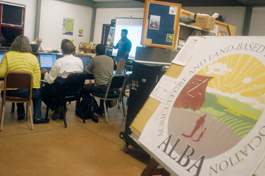home | metro santa cruz index | news | santa cruz | news article

The Exciting Field of Agriculture: Salinas-based ALBA is known for training organic farmers with few resources. Now it also teaches them business skills so they can keep their farms running.
Of Greens and Gigabytes
Salinas-based ALBA helps newly minted organic farmers get their computer on.
By Jessica Lussenhop
In the 10 years since musician Osvaldo Vergara moved to Santa Cruz from his native Chile, he'd heard rumors about a place that would teach low-income students how to farm organically, no experience necessary. He just didn't know how to find it. So when someone finally gave him an address, he didn't waste any time.
"I went there right away, the next day. I was talking to the people that was working there in the fields," he says. "It was my dream. I was waiting for this for a long time."
Turns out Vergara had found the Agriculture and Land-Based Training Association in Salinas, where people with limited resources have been learning how to farm for the last 25 years. What he didn't expect was for the staff to recommend that he complete a series of basic computer courses.
"The only thing I know is how to check my email," he says. "It was really hard to have a computer, even now, in Chile."
ALBA, which traces its roots to the Cesar Chavez era and aims to empower Latinos through education and agriculture, has helped hundreds of students get on their feet as independent organic farmers, teaching them everything from planting, harvesting and pest control to business models and fair employment practices. Enrollment cost is kept low, the fees commensurate with students' income level and number of dependents. But in the digital era, Natalia Bonilla, education program manager, says that the most essential tools are no longer just in the field.
"In order to be a successful business owner, we believe having basic computer skills is essential," she says. "We knew we needed the classes just to be up to speed."
The free classes, which are taught in both English and Spanish, are designed to ultimately help students keep meticulous business records on programs like Microsoft Excel. But when Bonilla says basic, she means basic, as was evident last week at the second session-Learning Microsoft Word-held in a stucco building plopped in the middle of the ALBA fields, shrouded in the nighttime fog and blowing dirt.
Growing Savvy
"Click 'cut'-see what happens," says instructor Trevor McNeil to a class of six students.
"Where's the thing?" a woman murmurs to the person next to her.
"I lost two sentences," says a middle-aged Hispanic man.
"I thought we were supposed to highlight-to click on the other thing," the woman says with increasing alarm.
"No, see, did you copy that?" says McNeil. "It's still-alive. The one thing I want to show you is that, unlike a typewriter or chiseling things into stone, nothing is in stone."
He goes to the student's computer, one of 15 HP laptops donated last year in a grant from the Hewlett-Packard Microenterprise Program, and shows her how to hit "paste."
"See, it's like it never happened," he says as the sentence pops back up on the woman's screen. "You're traveling back in time. Congratulations."
"Ohhhhh, wow. That's so useful," says another woman across the room.
Though anxiety like this runs high throughout the two hours, students like Vergara say that taking a class from an organization with such strong ties to the Latino community and to agriculture made him feel comfortable enough to try.
"When I found out the class is so simple, and it's the same organization who's going to tell you how to be a farmer, it makes sense," he says.
Bonilla understands the unease, and tries to make things as simple as possible.
"We try to establish our workshops to meet them where they are," says Bonilla. "And it's well known that the Chavez movement is really when it started, so there's kind of a connection."
Though it has strong roots in the Latino community, the new technology is not the only thing that is changing ALBA. More and more new students are white, black and Hmong. With the increasing popularity of organic food and the locavore movement, people like Judy Greenwald, a 63-year-old day-care provider, want to do more than just shop at the nearby farmers market.
"I'd love to live on an organic farm of my own, provide food for myself in my semi-retirement years," she says. Greenwald represents a more common example of inexperience-Americans who missed the technology boat by a generation. "I'm always calling my 18-year-old son down to help me," she says. "He gets so mad."
After the remaining two classes, Greenwald and Vergara will be ready to start the seven-month Farmer Education Program on Dec. 1. Like the computer classes, it starts from ground zero and builds them into competent organic farmers. Vergara views it as the beginning of a new life.
"I can see my future working the farm and teaching people about farming, and that's what I want to do, I'm going to do it forever," he says. "I really want to show people, Sí, se puede."
Send a letter to the editor about this story.
|
|
|
|
|
|